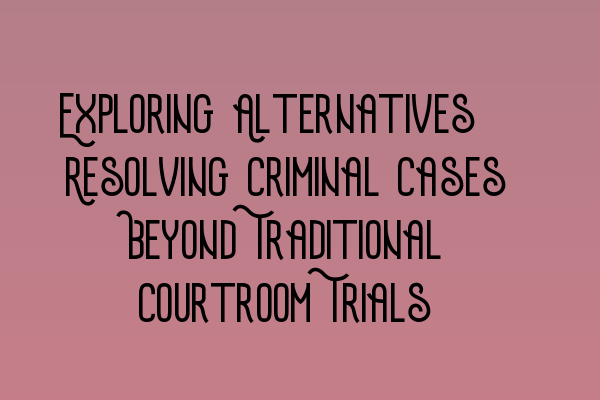Exploring Alternatives: Resolving Criminal Cases Beyond Traditional Courtroom Trials
When it comes to resolving criminal cases, traditional courtroom trials have long been the go-to method. However, in recent years, there has been a growing recognition that alternative approaches can offer unique advantages in certain situations. These alternatives provide an opportunity for a more efficient, cost-effective, and satisfactory resolution for all parties involved. In this article, we will explore some of these alternatives and discuss why they are worth considering in criminal cases.
Mediation and Arbitration
One alternative to traditional courtroom trials is mediation or arbitration. These methods involve a neutral third party who facilitates the negotiation process between the parties involved. Mediation is a collaborative process that aims to find a mutually agreeable solution, while arbitration is more akin to a mini-trial where the third party makes a binding decision.
Mediation and arbitration can be particularly useful in cases where the relationship between the parties needs to be preserved, such as business disputes or family matters. These methods allow the parties to maintain a level of control over the outcome, rather than relying on a judge or jury to make a final decision. It also offers a more confidential and private setting, which can be appealing to those who wish to keep their case out of the public eye.
If you are interested in learning more about mediation and arbitration, SQE Criminal Law & Practice Law UK offers informative preparation courses that can equip you with the necessary skills to navigate these alternative resolution methods. You may also find our SQE 1 Practice Exam Questions and SQE 1 Practice Mocks FLK1 FLK2 resources helpful in honing your knowledge of criminal law.
Restorative Justice
Restorative justice is another alternative approach that focuses on repairing the harm caused by a criminal offense, rather than simply punishing the offender. It involves bringing together the victim, offender, and community to engage in a dialogue that allows for understanding, accountability, and the opportunity for healing.
This approach has been particularly successful in cases involving non-violent crimes and juvenile offenders. By addressing the root causes of the offense and providing support to the offender, restorative justice aims to reduce the likelihood of reoffending and create a more harmonious community.
For those interested in restorative justice practices, SQE Criminal Law & Practice Law UK offers a range of SQE 2 Preparation Courses that delve into this alternative approach. These courses provide essential insights into restorative justice principles and techniques, allowing aspiring legal professionals to better advocate for this method in criminal cases.
Diversion Programs
Diversion programs offer an alternative to traditional prosecution and punishment for certain low-level and first-time offenders. Instead of going through the regular court process, eligible individuals can participate in a diversion program that focuses on rehabilitation, education, and community service.
These programs aim to address the underlying issues that may have contributed to the individual’s involvement in criminal activity. By offering support and guidance, diversion programs aim to prevent future offenses and reintegrate individuals back into society as productive members.
If you would like to learn more about diversion programs and their efficacy, SQE Criminal Law & Practice Law UK has SQE 1 Preparation Courses that cover this topic extensively. These courses provide comprehensive knowledge of diversion program policies and procedures, allowing legal professionals to explore this alternative option in depth.
Conclusion
In conclusion, traditional courtroom trials are not the only option for resolving criminal cases. Mediation, arbitration, restorative justice, and diversion programs offer valuable alternatives that can lead to more efficient, cost-effective, and satisfactory outcomes. These alternative approaches provide opportunities for individuals and communities to heal, learn, and grow beyond the confines of a traditional trial.
If you are interested in specializing in criminal law or exploring alternative resolution methods, SQE Criminal Law & Practice Law UK is your trusted resource. Be sure to check out our preparation courses, practice exams, and informative articles to enhance your knowledge and skills. And don’t forget to keep an eye on the SRA SQE Exam Dates to stay on top of upcoming assessments.
